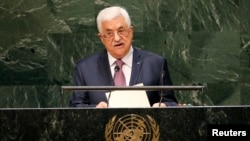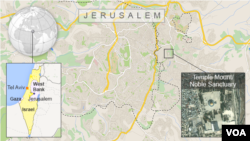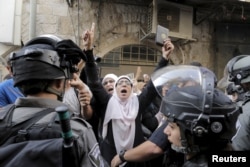Palestinian President Mahmoud Abbas has promised a “bombshell” announcement when he addresses the United Nations General Assembly Wednesday, but analysts on both sides of the Israeli-Palestinian conflict say they aren’t expecting much more than political theater.
Nor do they believe Abbas' speech will have much impact at a time when the Middle East peace process is far down the international community's agenda.
“Mahmoud Abbas has a major strategic dilemma on his hands,” said Josef Olmert, Israeli political insider and adjunct professor of political science at the University of South Carolina, “and that is how to make the Palestinian question in general, and the Palestinian Authority in particular, relevant again, at a time when the burning issues in the Middle East are Syria, Iraq, refugees and ISIS.”
ISIS is an acronym for the Islamic State group.
Olmert dismisses Abbas’ promises of a bombshell as “much ado about not much.”
Nor are some on the Palestinian side holding out much hope that anything Abbas has to say could breathe life back into the obsolescent peace process.
“I think it will be just like what we have seen in the past -- attempts to create excitement and enthusiasm around speeches that end up being nothing but symbolism,” said Yousef Munayyer, executive director of the U.S. Campaign to End the Israeli Occupation.
Other Arab leaders briefed
Abbas said he has already briefed Arab and other international leaders about the content of his speech.
He has put down rumors that he intends to cancel the 1993 Oslo Accords on the grounds that they have failed to achieve a Palestinian state. He has also denied reports he will dissolve the Palestinian Authority.
The Palestinian leader has said only that his speech will focus on the Oslo Accords and what he calls Israeli violations of the agreements, such as settlements and the demolition of Palestinian buildings. He has warned that a recent escalation in conflict could lead to another intifada.
In an editorial in the Huffington Post Tuesday, Abbas wrote, “It is time to finally achieve the independence of the State of Palestine, peacefully resolving the Palestinian-Israeli conflict -- the core of the Arab-Israeli conflict -- as was promised long ago.”
There is some speculation the Palestinian leader could declare the death of the two-state solution and advocate a single, bi-national state encompassing present-day Israel and the Palestinian territories, offering peace, security and equal rights for all factions.
A recent poll conducted by the Palestinian Center for Policy and Survey Research showed that 51 percent of Palestinians oppose the two-state solution.
But it is unlikely Israelis would accept a one-state solution because it would not have a Jewish majority and would negate the theological concept of a Jewish homeland.
“A one-state solution as envisaged by the Palestinians will not be,” said Olmert. “Israel is a one state, the nation state of the Jewish people.”
Whatever the Palestinian leader's announcement, it needs to be strong, said Munayyer, of the U.S. Campaign to End the Israeli Occupation.
“Something has to really shake things up, and preferably for all players involved, it should be a shake-up that is nonviolent to the greatest extent that it can be,” he said.
“But at the same time, he (Abbas) should send a message that something has got to change now. Not when the stars align in the Israeli government. Not when there’s peace between Palestinian parties. Liberation for the Palestinians, the basic rights of the Palestinians, is not something that we can put off until tomorrow," Munayyer said.
Uptick in violence
Clashes in recent weeks have centered on a site in Jerusalem sacred to both Muslims and Jews: Muslims call it Haram al-Sharif, or the Noble Sanctuary; Jews know it as Har Habayit, or the Temple Mount.
"After Israel captured East Jerusalem in 1967, there has been a status quo whereby Jews may visit the Temple Mount, but they are not allowed to worship there,” said Ron Kampeas, Washington, D.C., bureau chief of the Jewish Telegraph Agency.
Jews and Christians are permitted to enter the compound from 7:30 to 11:30 a.m. but may not pray.
“But today, fewer and fewer people abide by that, and there’s a greater eagerness among Israel’s nationalist religious camp to go up to the Temple Mount,” Kampeas said.
"And the response of other sectors, including individuals within [Israeli Prime Minister Benjamin] Netanyahu’s ruling coalition, has been, ‘Why shouldn’t Jews be able to worship on the Temple Mount, as long as they don’t force Muslims out?’ ”
The latest violence broke out just prior to the Jewish New Year, Rosh Hashanah, which always brings more visitors to the compound.
Muslim youths barricaded themselves inside the Al-Aqsa mosque, despite new restrictions that allow only men over the age 50 to enter the compound. They have thrown rocks and firebombs at Israeli police, who have responded with tear gas and rubber bullets.
Tougher new laws
Tensions have also been exacerbated by Israel’s recent decision to toughen penalties against stone-throwers.
On September 16, Israel announced prison sentences of up to 20 years for anyone caught throwing rocks, and penalties for parents of children who throw rocks and other objects at Israeli police.
Israel has also relaxed rules regarding the use of live fire by Israeli police and soldiers.
Under the new policy, security forces will be able to fire .22-caliber rifles in situations in which they deem they or anyone else is in danger.
“Any time you loosen up on fire rules, you increase the possibility that there will be casualties, and any time casualties increase, you create the opportunity for extremists to exploit that and to further flame the situation,” said Kampeas, of the Jewish Telegraph Agency. “So Netanyahu is walking a very fine line over there.”
UN briefing
In a September 15 briefing before the U.N. Security Council, Nickolay Mladenov, U.N. special coordinator for the Middle East Peace Process, expressed concern over continuing Israeli settlement expansion and demolition of Palestinian structures in the West Bank and East Jerusalem.
Five days earlier, the U.N. had voted in favor of raising the Palestinian flag at its New York headquarters in support of Palestinian aspirations for independence.
On Wednesday, for the first time, Abbas will take part in a U.N. flag-raising ceremony.






